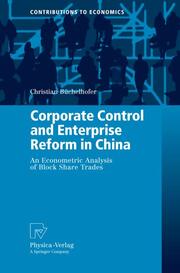Detailansicht
Corporate Control and Enterprise Reform in China
An Econometric Analysis of Block Share Trades, Contributions to Economics
ISBN/EAN: 9783790820195
Umbreit-Nr.: 1211116
Sprache:
Englisch
Umfang: xi, 115 S.
Format in cm:
Einband:
gebundenes Buch
Erschienen am 04.02.2008
Auflage: 1/2008
- Zusatztext
- This intriguing study sheds light on the efficiency of corporate control allocation in Chinese listed firms. Using a panel data set for the period 1996 to 2006, it examines the frequency, causes and consequences of changes in corporate control. The results indicate that poorly performing firms are the predominant targets of control changes. The findings provide insights into the motives and constraints of the key players involved in governance practices in China.
- Kurztext
- This study sheds light on the efficiency of corporate control allocation in Chinese listed firms. Using a panel data set for the period 1996 to 2006, it examines the frequency, causes and consequences of changes in corporate control. The results indicate that poorly performing firms are the predominant targets of control changes; shareholder and creditor control generally act as a complement for changes in control. Following the change in ownership there is a substantial amount of corporate restructuring and an improvement in operating performance. Significant differences in these dimensions emerge, however, between State and private transfers of control. The findings not only provide insights into the motives and constraints of the key players involved in governance practices in China; but they also contain useful implications for other emerging markets around the world that have weak legal systems and weak property rights protection.
- Autorenportrait
- InhaltsangabeChina's reform process, stock market development, and testable hypotheses.- Data, concept of control, and summary statistics on changes in control.- Causes of changes in ultimate share ownership.- Consequences of changes in ultimate share ownership.- Conclusion.
